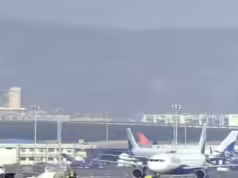Washington D.C. – A new awareness campaign alerting Americans—Iranian Americans in particular—to the serious dangers of visiting Iran has been announced by the US State Department. American citizens, especially those with Iranian ancestry, were urged by US State Department spokesman Tammy Bruce to avoid visiting Iran.
Bruce emphasized that the Iranian regime does not recognize dual nationality and refuses jailed US nationals consular access during a press briefing on Thursday (local time). She declared that a new website will be launched by the US Department of State to caution Americans against visiting Iran.
“The department is launching a new awareness campaign to alert Americans—Iranian Americans in particular—about the ongoing serious dangers of traveling to Iran,” she said. The Iranian government often refuses jailed US nationals consular aid and does not recognize dual nationality. And while the bombing has ceased, that does not indicate that it is safe to travel to Iran, it is not. Additionally, we are developing a new website to caution Americans about visiting Iran. There it is (pointing to the website that is visible on the screen). That webpage is available starting at state.gov. I believe you can find that very ease if you search on state.gov.
You can notice that the message is clear in a variety of languages. There are also our travel advisories. They are still in place, and as I have stated several times from this stage, we cannot emphasize this enough. Avoid going to Iran, especially if you are dual citizens with Iranian ancestry. Iran is a dangerous place for anyone to visit. And once more, this adds to the current travel warnings. At travel.state.gov, it doesn’t replace them. I believe our message is clear,” she continued.
The statement from the US State Department was made in the midst of current tensions brought on by the Israeli-Iranian conflict and US strikes on Iranian military and nuclear facilities.
US President Donald Trump stated earlier this week that he is cautiously optimistic about preventing more military action against Iran, pointing out that Tehran is similarly opposed to such action. In order to stop any more military measures, he added, Iran wants to meet and “work something out” between the two countries.
I’m hoping we won’t have to do that. That is not something I could ever want to do. They wouldn’t want to do that, in my opinion. Iran wants to meet with them. They wish to find a solution. During his meeting with Israeli Prime Minister Benjamin Netanyahu at the White House on Monday (local time), Trump stated, “They are very different now than they were two weeks ago.”
Trump acknowledged that the United States has intentions to engage in communication with Tehran when asked if any negotiations with Iran were planned. “We are scheduled to meet… We’ll wait and see. We have planned negotiations with Iran. They’d like to speak. When we hit the three sites, I believe they were severely beaten,” Trump continued.
According to Al Jazeera, Iranian President Masoud Pezeshkian had previously stated his belief that Tehran could resolve its differences with the US through conversation, but he also acknowledged that it would be challenging to establish trust because of previous US and Israeli attacks on Iran.
Israel initiated “Operation Rising Lion” on June 13 to begin extensive attacks on Iranian territory, focusing on missile production facilities, Islamic Revolutionary Guard Corps (IRGC) command posts, and nuclear complexes at Natanz and Fordow.
According Iranian reports, the operation resulted in the assassinations of several senior IRGC commanders and nuclear scientists. Following this, on June 22, US strikes under “Operation Midnight Hammer” targeted Iranian nuclear infrastructure as well.
Iran then attacked a US military installation in Qatar and launched missile strikes against Israel in retaliation. Iran denounced both operations as flagrant violations of the UN Charter and international law.







